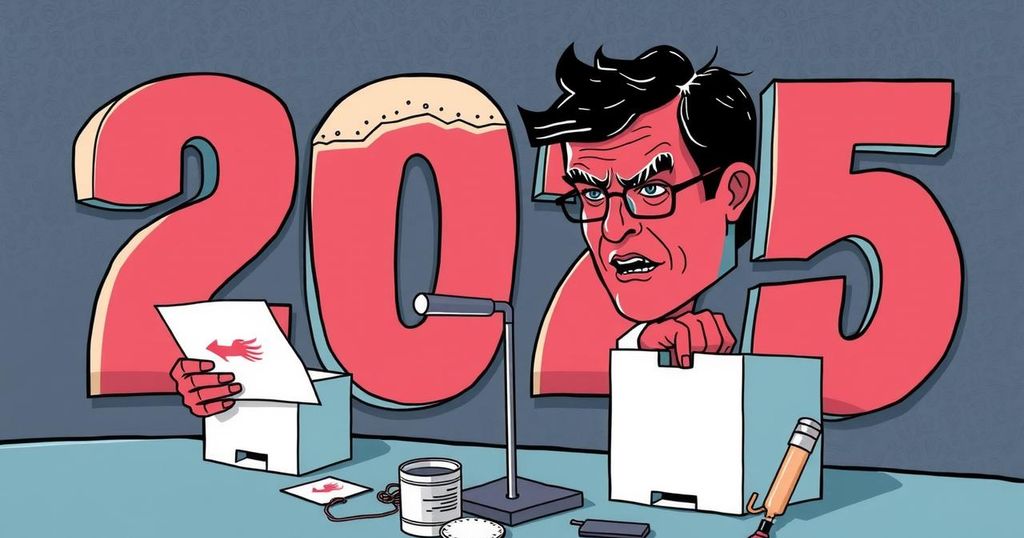Navigating the Electoral Turmoil Ahead: Challenges and Opportunities for 2025

As the world approaches a challenging 2025 filled with potential elections in turmoil, many nations find themselves facing ongoing conflicts, violence, and insecurity. With over 70 countries set for national polls, it is crucial to address electoral integrity through enhanced security measures, legal reforms, and infrastructure rebuilding to capture the electorate’s will and promote stability amidst uncertainty.
As we conclude what has been termed the “super-year of elections,” in which over 800 million individuals participated in polls across nearly 80 nations, the impending electoral landscape of 2025 appears precarious. Numerous countries preparing for elections find themselves engulfed in turmoil stemming from conflicts, political violence, and heightened insecurity. Under such circumstances, electoral processes possess the potential to either reinforce governmental legitimacy and facilitate a new chapter of stability or to exacerbate existing discontent and unrest among the populace. The international community must intervene strategically to foster a conducive environment for successful elections.
The upcoming elections are plagued by significant instability, with more than 70 nations poised for national-level polls, many still in a phase of conflict. Countries such as Libya, Mali, and Burkina Faso present alarming predicaments in terms of their electoral credibility, with ongoing power struggles and military interventions limiting electoral prospects. Nations like Belarus, while not categorized as conflict zones, exhibit severe political repression, undermining any semblance of legitimate electoral processes. The multifaceted nature of these challenges necessitates comprehensive measures to pave the way for credible elections.
Addressing security concerns is paramount, as peaceful participation of candidates, voters, and observers must be ensured. Effective law enforcement, alongside a robust legal framework to curtail intimidation and repression, should be prioritized. Moreover, incumbent advantages in media exposure during crises must be mitigated to promote diverse political perspectives. Initiatives to reconnect political leaders with the electorate’s needs are essential to combat declining voter turnout, as evidenced by previous elections in Iraq. Beyond physical security, safeguarding against domestic and foreign interference in electoral processes is essential to maintain the integrity of information and outcomes.
Additionally, countries overcoming past conflicts must rebuild essential infrastructure and electoral systems to facilitate smooth election operations. Countries like Haiti, which have suffered severe disruptions, must focus on damage rehabilitation while securing funding for necessary equipment and civic education initiatives. Furthermore, addressing the loss of human capital due to displacement is crucial, as the absence of political leaders and active citizens severely affects the vitality of democratic processes.
The intricate nature of organizing national elections in unstable environments heightens the necessity for immediate action. Delays in addressing grievances or technical issues could intensify public perception of power struggles or corruption. Historical data indicates that international support often correlates with successful transitions from autocracy to democracy. Therefore, bolstering countries facing electoral turmoil is mutually beneficial; democracies typically engage positively within the global community and uphold fundamental human rights.
As 2025 approaches, demonstrating leadership in supporting nations facing electoral challenges becomes paramount. The establishment of basic democratic conditions must commence earnestly, engaging stakeholders during the tumult of impending elections to ensure they accurately reflect the will of the populace, thereby charting a course for renewed stability and governance.
The topic encompasses the upcoming electoral landscape in 2025 following a tumultuous global period of elections characterized by significant electoral participation amid widespread instability. As countries emerge from conflicts or face political crises, the integrity of elections is increasingly jeopardized, necessitating urgent reforms and interventions. Addressing the myriad issues faced by nations preparing for elections, ranging from security and infrastructure to human capital, is vital for ensuring that elections serve as a legitimate channel for expressing public will.
In summary, the electoral challenges ahead in 2025 require immediate attention from both national authorities and the international community. The intricate web of political turmoil underscores the need for strategic security, legislative reforms, and infrastructure rebuilding to facilitate credible elections. By prioritizing these areas, the integrity of the electoral process may be preserved, ultimately fostering democratic governance and stability across numerous nations.
Original Source: www.ifes.org








